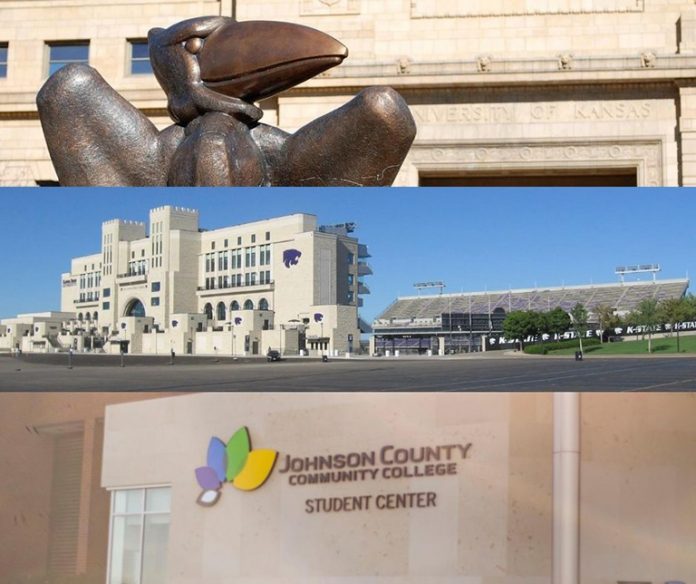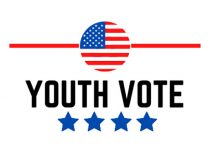
JCCC, along with many other Kansas colleges officially began the Fall semester on Monday, Aug. 24. However, this semester started out unlike any other, as the majority of classes are being taught through a virtual setting. For the first time ever, students weren’t crowding the cafeteria trying to grab lunch before their next class starts or wandering the halls in search of their professor’s offices. This semester students opened their laptops or phones and searched for the Zoom links that their professors would use to welcome them to the first day of class.
While most classes have shifted to online learning many colleges and universities decided to reopen their campus for student this Fall. The University of Kansas, Kansas State University and Johnson County Community College have all opened their campuses successfully, but not without some issues along the way. Each college handled opening campus differently, with varying approaches, but resulting in similar outcomes. All three campuses have taken precautions to slow the spread of COVID, but with the number of cases increasing daily it’s evident that no approach completely has positive outcome.
University of Kansas student, Tatum Goetting only has one in person class this semester with the rest held through Zoom. Goetting is a sophomore and lives in one of the scholarship halls offered through KU. Normally, scholarship housing students have access to a dining area where they prepare all of their meals. Due to COVID, the kitchen has been closed.
“I live in Rieger Scholarship Hall, which is basically a dorm,” Goetting said. “Usually the scholarship halls have a reduced food plan because we cook in the hall. We have a kitchen and food bar manager, but they’ve cut off the kitchen area. They reimbursed us for the payment of the kitchen […] they made that into a dining plan for us. I’ve never had to use a dining plan before, and I don’t really like it because it’s the same food over and over again. There’s no variety. It’s a very small complaint, but it’s really frustrating that we can’t use our kitchens.”
Around the KU campus, there are numerous hand sanitizing stations, signs and posters detailing the guidelines that the administration has set for them. Lecture halls that have the capacity to hold thousands of students at once have been reimagined to fit social distancing standards. Additionally, the campus has a mandatory mask wearing policy for students, faculty and visitors.
“We have an app, called CVT and you have to record your symptoms each day,” Goetting said. “[When] I submit all of my answers my health status is blue which means I can go anywhere on campus. They have these little iPads outside of each building that you have to scan [your pass] before you go in, but I honestly don’t know how effective that’s been. Some places have a person monitoring it, but I went somewhere and there was no one there. I still scanned [my pass], but there was no one there to check.”
Similarly, to KU, Kansas State University has some of the same precautions: mandatory masks in classrooms and buildings, physical distancing at in-person classes and a strong urge to keep COVID cases down. Student Riley Siebert is a senior at KSU and is also a member of Alpha Gamma Delta.
“[The first week] has been pretty good for me,” Siebert said. “I just had my first in-person class [earlier this week], but everyone is required to wear mask at all times, which everyone was doing perfectly fine. There are a bunch of hand sanitizer stations everywhere, they’ve blocked off certain seating places and made sure like any like sitting areas are six feet apart. Then they have specific stairs, designated for only going up or down o you’re not passing people; everyone has been keeping their distance.”
As a member of AGD, Siebert lives in the sorority house with other members. Obviously, due to the pandemic there are more restrictions that members must follow and with everything being a shared space, the girls are more cautious than ever.
“We have to wear masks everywhere in common areas, we’re only allowed to take them off in our rooms,” Siebert said. “Our foodservice used to be self-serve, now we have someone serve it for us. We give them our plates and they’re wearing a mask and gloves; everything is getting sanitized before and after being used. There’s just a lot more cleaning precautions and stuff like that.”
While there are many precautions that KU and KSU is taking there have still been multiple outbreaks on campus which have all been associated with their Greek life. Prior to classes starting, sororities held their recruitment for potential new members. The weeklong process was held virtually, but there were several cases in which fraternity and sorority members were seen breaking the mandatory guidelines that have been set. This led to the frustration of many as there was seemingly no consequences for those specific houses that weren’t following the rules.
“Some frats have been [called out] in relation to having events, but Kappa Sigma had a huge lawn party that went viral over the weekend,” Goetting said. “Honestly, it’s just embarrassing. I know that the majority of people on campus are following the rules. It’s a small group of people in Greek life that are going to ruin it for everyone. I don’t want to generalize that all of Greek life is doing this, but it’s really frustrating to see people disregard all the rules.”
After the video of Kappa Sigma circulated around the internet a cease and desist letter was issued to them as well as another fraternity on campus. The problems of reopening aren’t just exclusive to KU.
“Most friends are in my sorority, so we all live together, but I’m assuming there probably are people [and houses] having parties,” Siebert said. “In Aggieville, which is our bar district, they had some problems [with reopening], but Riley County shut it down. They’ve been starting to do like citations [for bars not following guidelines]. There was an outbreak at Phi Delt that made pretty big news. They had to quarantined all of the guys [in the house]. I know they’re taking it pretty seriously, considering they were the first outbreak on campus.”
Likewise, JCCC has all of the same precautions as the previous two colleges, yet they’ve reported significantly less COVID cases. Taking into consideration that there is no housing or Greek life on campus, it’s no surprise that JCCC would have less cases however, no school has had a smooth transition this semester.
JCCC student, Cody Andrews transferred from KSU after having a scholarship fall through due to the COVID crisis. Additionally, Andrews didn’t feel comfortable attending a university that had no plan on how it would handle the Fall semester.
“[It’s been] frustrating,” Andrews said. Not a lot of [teachers] necessarily know like how to use the technology. They have a little bit of experience from last semester and the summer semester, but they don’t fully know. If they do, it’s still really hard and it takes almost double the amount of time [to do one thing] than it would if it was actually in-person. I can’t really focus because it’s not a learning environment. There are distractions in your own home that you can’t really help or wherever you happen to be at that moment. It’s really frustrating and I don’t think anyone is getting the full amount of what they’re paying for.”
Like many students who are at home this semester watching how each school navigates the pandemic, Andrews feels as though the schools are not being as responsible as they should.
“They’re handling it more as a business,” Andrews said. “They don’t want to lose money that they put into sports that have been planned for so many years. KU is a little embarrassing for Kansas especially, because they’re pretending as if their Greek life wouldn’t do that. No one is really thinking about it like they should. If we want to keep rates down, then why are we opening [our colleges]. Not everything needs to open; I don’t need to go shopping for clothes or sit inside of a restaurant and I don’t need to go to classes that can easily be taught online. If they put the same amount of money into their online classes as the sports teams no problems would occur, but they’re not going to do that because that’s less money in their pocket.”
As the semester continues and COVID cases go up the likelihood of all campuses closing again becomes more of a reality.
“As everyone has seen cases are rising in Douglas County because of KU,” Goetting said. “I don’t know if KU will be the first school to send people home. I think if other schools such as Mizzou, University of Nebraska or Iowa State start sending people home in the next few weeks, we’ll probably follow and so will K-State. If I’m being completely honest, I am still very frustrated with KU as a whole, because they knew putting students on campus would interfere with their health. They knew people would get sick because its inventible. I think if, a 19-year-old undergrad student, can understand that going back [to campus] is not a good idea, then a 40-year-old chancellor should know that. I think KU is handling it well considering, but I think it could’ve all been avoided if we were remote.”
By Alieu Jagne

























[…] News story taken from The Campus Ledger. Originally published on September 3, 2020. […]